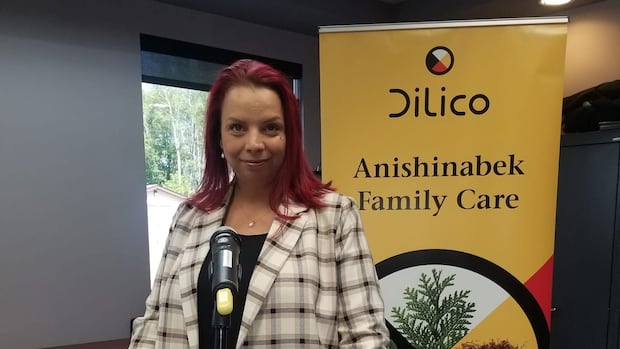TorontoOn the heels of expected federal legislation aimed at revamping the bail system, a new report from the John Howard Society of Ontario is calling on the province add more bail beds and expand the bail verification and supervision program across Ontario. Advocates say it will free up space in an overcrowded correctional system, and keep the focus on violent offenders. John Howard Society says bail beds, bail verification supervision program part of reforming the bail systemAlicia Gordon has spent time in and out of jail for years. She says admittance into a bail verification and supervision program at a Thunder Bay facility was the catalyst to helping her get her life back on track. (Submitted by Alicia Gordon)Alicia Gordon has had her share of run-ins with the law, from property crime to break and enters, while also struggling with a substance abuse disorder. The Thunder Bay, Ont., woman was in and out of jail between 2019 and 2021, when she connected with a bail verification and supervision program (BVSP) run by the John Howard Society that connected her with the supports that helped her get sober. “It became like a safety net,” she said. On the heels of expected federal legislation aimed at revamping the bail system, a new report from the John Howard Society of Ontario is calling on the province to take action and expand the bail verification and supervision program, including bail beds, to more locations across the province. It’s a way to ensure non-violent offenders have the best chance at following through with their bail conditions, says Safiyah Husein, the society’s director of policy. She says 80 per cent of people in provincial jails are legally innocent people, awaiting trial or a bail hearing. “A lot of people in the criminal justice system, in the bail system, are dealing with a lot of complex social and health issues, including mental health issues, addiction, homelessness and poverty,” Husein said.“What we’re hearing is that the system is under strain,” she said. “We should be able to focus on serious violent cases, but it’s forced [us] to manage a lot of these complex social and health issues.”The report brought together police services, lawyers, and community service agencies across the province to weigh in on issues within the bail system, Hussein says. How bail verification and supervision programs work The BVSP program allows individuals to be released into the community while they await trial, but also connects those individuals with support services, says Husein. The program was originally intended to be an alternative to surety, which is when a person comes to court and pledges money and promises to supervise the accused person while out on bail. The BVSP program differs, as it takes in an individual out on bail and provides them with support to help address issues such as a lack of employment or housing, mental health issues, and addiction issues. “Ninety-six per cent of clients attend all of their court dates and the vast majority complete the program with no breaches of conditions,” Husein said. Safiyah Husein, the director of policy at the John Howard Society of Ontario, says expanding the BVSP can ensure non-violent offenders have the best chance at following through with their bail conditions (Kelda Yuen/CBC)The program also features bail beds across the province, which act as a shelter where individuals who don’t have housing upon release can be supervised 24/7. “They would otherwise spend longer in jail while the courts develop an adequate release plan,” Husein said. “An expansion of these [programs] would really improve system outcomes and reduce pressures on jails and police and courts.”BVSPs are provided to people based on the risk level of the individual, says Kara Hart, CEO at the John Howard Society of Peel-Halton-Dufferin.“Are they a repeat offender, and what’s the risk of them repeating the current offence?” Hart said. “If they have a long history of violence, that’s not something the program can supervise.”The program is about early intervention, which Hart says leads to positive outcomes. ‘Support rather than surveillance’ needed, criminologist saysWhen people who struggle with housing, mental health concerns or substance use disorder are part of the program, it can minimize their risk of failing to appear in court or their risks to public safety, says Nicole Myers, a criminology professor at Queen’s University. “What we really want to be seeing is support rather than surveillance,” she said. Myers says this would allow the system to focus on those who are arrested and charged with more serious crimes and who pose a greater risk.“Those are the folks that we may need to be keeping in detention,” Myers said. WATCH | Toronto police take action to improve bail compliance:How Toronto police are trying to improve bail complianceThe issue of bail reform is back in the spotlight as Toronto police work to improve a program to allow officers to conduct more compliance checks. CBC’s Farrah Merali explains how it works. In a statement, Julia Facca, press secretary for Ontario’s Attorney General Doug Downey, said the minister’s office looks forward to reviewing the report and its recommendations. “Our government will continue working to protect Ontario communities and strengthen our call to the federal government to get serious and deliver real bail reform this fall,” Facca said.Alicia Gordon poses with her kids and her partner. She says had she not gotten out on bail and into a program when she did, it would have meant not having a relationship with her children, something she says she cherishes deeply (Submitted by Alicia Gordon)As for Gordon, she says the program has helped her not only stay sober, but also find steady employment, a long-term relationship and to reunite with her children. “What I really wanted was my children,” she said. “If I hadn’t gotten bail when I did, my life would have been completely different. … Not only would I have served a sentence, my children would have too.” ABOUT THE AUTHORKirthana Sasitharan is a journalist with CBC Toronto. She has spent time travelling Ontario, telling stories in Thunder Bay, Sudbury, Ottawa, Kitchener-Waterloo, and Hamilton. She previously worked as a business reporter in Vancouver and Ottawa. She is passionate about stories related to the correctional system, community and animals. You can reach her at kirthana.sasitharan@cbc.ca.
Wednesday, 4 Mar 2026
Canada – The Illusion
Search
Have an existing account?
Sign In
© 2022 Foxiz News Network. Ruby Design Company. All Rights Reserved.
You May also Like
- More News:
- history
- Standing Bear Network
- John Gonzalez
- ᐊᔭᐦᑊ ayahp — It happened
- Creation
- Beneath the Water
- Olympic gold medal
- Jim Thorpe
- type O blood
- the bringer of life
- Raven
- Wás’agi
- NoiseCat
- 'Sugarcane'
- The rivers still sing
- ᑲᓂᐸᐏᐟ ᒪᐢᑿ
- ᐅᑳᐤ okâw — We remember
- ᐊᓂᓈᐯᐃᐧᐣ aninâpêwin — Truth
- This is what it means to be human.
- Nokoma











